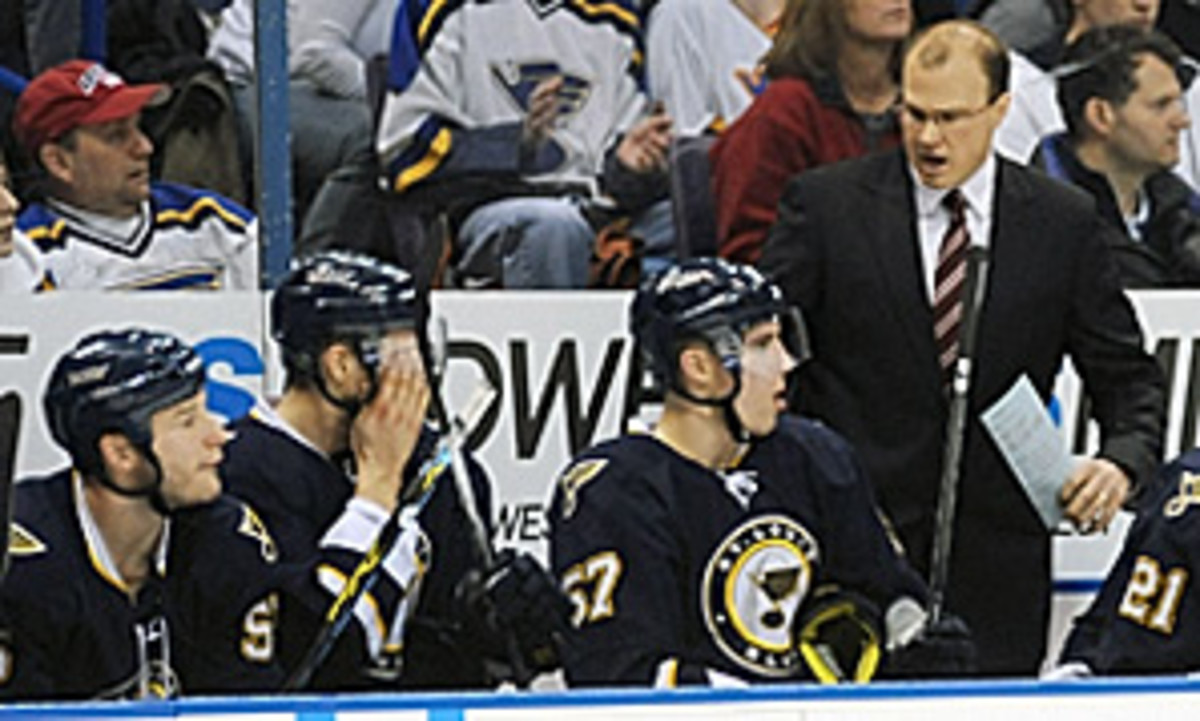Blues seek spark while looking long term with Murray firing
At first glance, Andy Murray's firing in St. Louis was barely news. Coaches -- and Murray himself -- have been "relieved of their duties" at midseason when their teams fail to live up to expectations. Yet, the details in this particular change are telling on many levels.
Replacing Murray with Davis Payne is about the immediate and the long term. President John Davidson was both forthright and classy in his assessment of Murray's contributions: "When Andy got here (in December 2006), the building was half full. He's a big reason the fans have returned. The stretch run last year was special to be a part of and, as such, Andy earned his contract option being picked up for next year."
Nice tip of the cap. But then the reality: "We have to be better at home. We've seen some good things (at Scottrade Center), but not enough. As an organization, we felt that it was time for a new voice."
With a 6-14-3 mark in St. Louis, and the Blues near the bottom of the Western Conference standings as the new year dawns, you can understand Davidson's sense that a change might do some good. "At the end of the day, we felt it was up to us to lift the weight of the cloud hanging over us," he said.
In other words, team lethargy is often tied to the players "feeling" that something might happen to shake things up. In this case it did, as Davidson will try to recreate a second-half changing moment like last year's when Murray turned the goaltending over to Chris Mason, who responded by backstopping an improbable run from fifteenth in the conference to sixth and the team's first postseason berth since 2004.
The Blues are now 12th, 11 points out of a playoff spot, as of this writing. "We're a .500 hockey team on paper (17-18-6) and our goal is to be better than that, especially with winning hockey on home ice and being a playoff team," Davidson says.
In the big picture, though, the Blues put a lot of thought into this change. First, Payne's hiring is in keeping with a league-wide trend of teams turning to young coaches from the AHL, a topic we've covered here a couple of times over the past two seasons. Davidson cited Ottawa (Cory Clouston), Pittsburgh (Dan Bylsma) and Colorado (Joe Sacco) as teams that looked internally for help and went with the head coach of their minor league affiliate.
Davidson also acknowledged that Payne, 39, inherits a "whirlwind" but has grown into the job since coming into the organization, first as an AHL assistant and then as the bench boss in Peoria last year, where he guided the team to the playoffs after a two-year hiatus. More importantly, Payne's communication skills came into play.
"We think Davis Payne can grow our kids based on his work with our prospects in Peoria," Davidson continued. "Our young players need to be better here. We had to fast track some players -- without them having the benefit of going to the AHL and getting pro experience. We feel Davis's work with them was the type of touch needed here."
Where the Blues take it further is by moving longtime assistant Rick Wamsley behind the bench in Peoria. It allows him the opportunity to pursue his ambition of becoming a head coach while the Blues send him back to the AHL to learn the ropes with an understanding of what's expected and needed at the NHL level. The moves remind me of corporate cross-training strategies designed to keep good people motivated.
So, the Blues changed coaches, but it wasn't just change for change's sake. It was, in Davidson's words, "change as part of the evolution of our organization."
For now, though, it's about getting down to the details of winning some games on home ice and seeing if the Blues have another miracle run in them.






